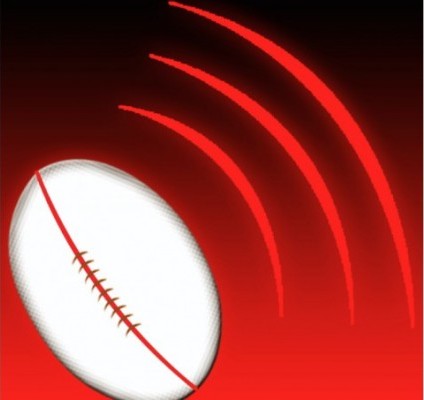RWBB 3 - The Movie Review
RWBB 3 - The Movie Review
The idea that coaches and sports help young people out of difficult circumstances is a strong one, a good and demonstrably true adage, but that doesn’t mean the journey upward is easy.
More than anything, that’s the message from the third installment of documentaries following the ICEF rugby program on tour.
The film Red, White, Black and Blue 3 follows the boys and girls from the Inner City Education Foundation in Los Angeles. ICEF is a public school charter organization helping kids from the city achieve academically and in life. Stu Krohn and David Hughes coach the rugby teams from ICEF, teams that have produced some excellent talent. More than that, the rugby teams have allowed the players to tour the world; they went to New Zealand in RWBB 1, and China in RWBB 2. Along the way we’ve been given an inside look into the trials of growing up in rough neighborhoods in Los Angeles, the inevitable personality conflicts and drama on a sports team of high-schoolers, and the journey for some of them to get to college, and make something of themselves.
This time, in RWBB 3, the kids travel to England and France, where the boys play in the Rosslyn Park 7s, and the girls play a series of games. It’s a hard road. The teams they face are very skilled, very accomplished - the first team the boys play is the USA High School All American team.
Unlike on other tours where the ICEF team surprises some and wins a lot, this group, made up mostly of seniors, many on their third tour, loses pretty much every game.
My Birth Father is Incarcerated
That struggle to win provides the tenor of the film. The kids are finding that it’s hard out there in the world. Krohn, who brings an unflinching positivity to the effort, says this in the film - doing regular things in life, such as your laundry or handling different personalities or being on time - can be very hard.
But the kids have seen harder. We hear about kids whose siblings have been murdered, whose fathers have left, whose families don’t understand the value of what they’re doing. On player on the girls team talks about her “birth father” being “incarcerated.” The statement is blunt in its acknowledgement of the truth, and yet poignant in how she distances herself from it all. Even the word “incarcerated” rather than the term “in prison” seems to be an effort at self-preservation.
He Likes to Quote the Odyssey
Krohn is a passionate coach, and this write has seen him angry and grouchy. But he’s almost avuncular in this film, managing kids who seem at times raw with emotion as they leave what has become the security of the rugby team for the unknown of college.
It’s never going to be exactly like this again, he says. Its a harsh notion, but true, and yet he is always ready to smile, to get them to the game, to encourage as they give up a try. And he’s there with advice, help, and a stern word. The film follows some drama between Elona and Nia, two of the best players on the girls team and good friends. Nia, who has been written about on Goff Rugby Report and seems to be a rising talent, is also an emotional, angry young woman. She fights with Elona, and it’s up to Krohn to patch things up. He does with a long private conversation (that ties in the journey Odysseus endured to return home from Troy), and the result is real, and imperfect, and a lesson that there are always consequences.
“I want,” says one player, “to make Mr. Krohn proud.” You get that sense they all feel that.
Nothing Motivate Me
There are anger and issues among the boys, too. Noah acknowledges how he found it hard to care about anything, and it quickly become clear that his apathy is the result of repressed anger - anger that comes out on the rugby field. He’s nicknamed ACL because he has injured so many of his teammates in practice (on the girls team, Nia says the most physical games her team plays are in intrasquad scrimmages). It’s a cruel nickname, but it’s a cruel world. You have to be careful. Noah is angry, and has to learn, at 17, how to manage that.
The lesson is dealt somewhat gently. The players laugh about it a little and ease Noah into managing things (with a gentle reminder that Cameron is going to play football at UCLA, and would Noah please not crush his knee before he gets there). The coaches show patience with these young men, and certainly it seems that angry young African-American men might benefit, at times, from a little patience.
It’s Like Hogwarts
The team stays at Wellington College, the school where coach David Hughes (and, coincidentally, current USA 7s team captain Madison Hughes) attended. Hughes shows the players a completely different world of wood-paneled halls, a manor house as the main building of a school, fields upon fields upon fields. Green grass, safe students.
The Hogwarts comment is expected, but speaks more to how much of a different world this, the castle they visit, and Stonehenge is to them.
And yet, many on their third tour, they take it in stride. They don’t cower, they embrace, and explore. When former Santa Monica player Lord Charles Courtenay of Devonshire invited his former coach (Krohn) and players to Powderham Castle, his ancestral home, they get an even more imposing view of another world.
It is there, though, that it all comes out. Charlie Courtenay invites the players to sit and meditate in the old chapel, and there players are invited to share there thoughts. Pain, tears, love, and long-repressed feelings pour out.
Well-filmed with clarity and an eye for beauty by James Brown, all three RWBB films were about rugby exposing some sheltered black kids to the world. But in RWBB3, rugby is more of a backdrop. We learn the scores and see the games, but none of that - the rugby, the camaraderie between opponents, even the culture shock - is all that new to them, or perhaps to us, now. Instead, we see the movement of players from kids in school with big dreams, to seniors graduating, figuring out what that dream is.
Cameron Griffin is off to his football scholarship at UCLA. That’s a pathway that seems set, and Griffin is a quiet part of the film as a result. He’s solid, comfortable, confident. But for the others it’s a little different. They are on tour as they hear about college decisions. Not everyone hears what he or she wants. “We are sorry to inform you blah blah blah,” says one player. KIds learn that "you can be anything you want" is true, but only kind of true. You can be anything you want, maybe just not right now.
Do they get through the Black and Blue part of growing up? Do any of us? RWBB 3 is an intense and serious look at a sports team trying to help kids, and kids trying to help themselves. It’s not always easy. It’s not always perfect. Good people act like jerks. Good teams lose rugby games. But the team helps, and the players help each other, and the coaches do good work. RWBB3 takes a bunch of inner-city kids from Los Angeles, all of them African American and most who had never seen anywhere other than LA until they started playing rugby, and plunks them in the middle of an English public school (which means private school in American), and shows us how they deal. They do pretty well, but in a real way, and it’s worth watching.
Red White Black & Blue 3 is directed by New Zealand-based filmmaker James Brown, and is the third film made about the ICEF program. To learn more about this award-winning eries, go to:
http://redwhiteblackandbluemovie.com/











